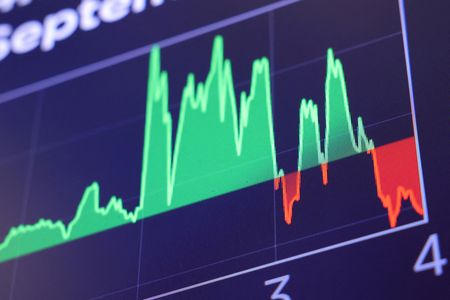By Lawrence Delevingne, Dhara Ranasinghe
BOSTON/LONDON (Reuters) -Bitcoin traded near $100,000 on Thursday as investors bet on a friendly U.S. regulatory shift, while world stocks pulled back slightly but held near record highs ahead of a key U.S. jobs report.
France’s government lost a confidence vote late on Wednesday for the first time since 1962, with far-right and leftist lawmakers joining forces to topple Michel Barnier’s government. The move had been widely anticipated by investors, so the euro, French stocks and bonds were largely steady on Thursday as Barnier officially resigned.
U.S. stocks dipped, a day after all three major U.S. stock indexes scored record closing highs, helped by the comments from Federal Reserve Chair Jerome Powell.
The Dow Jones Industrial Average fell 0.55%, to 44,765, the S&P 500 dropped 0.19%, to 6,075 and the Nasdaq Composite lost 0.18%, to 19,700.
Powell said on Wednesday the U.S. economy was stronger than it had appeared in September when the central bank began cutting interest rates, allowing policymakers to potentially be a little more cautious in reducing rates further.
“Already elevated consumer optimism towards the stock market has moved even higher since the start of the Fed’s easing cycle and the U.S. election, partly on hopes of lower taxes, deregulation and strong corporate profits,” Jeff Buchbinder, chief equity strategist for LPL Financial, wrote in a note on Thursday. “However, this support for stocks is offset by stretched valuations, excessively bullish sentiment, and the potential for the economy to cool in 2025.”
BITCOIN IN THE SUN
It was bitcoin’s day to shine, as the cryptocurrency hit the $100,000 mark for the first time. It was last trading around 1.5% higher on the day, near $99,400.
Its latest surge followed Trump saying he would nominate Paul Atkins, who is pro-crypto and pro-deregulation, to run the Securities and Exchange Commission.
“At the end of the day, it’s just a number,” said Geoff Kendrick, global head of digital assets research at Standard Chartered.
“But the reality is we’ve been able to get to this level because the industry has become institutionalised this year particularly – and that’s mostly the ETF inflows,” Kendrick said, referring to exchange traded funds approved earlier this year.
U.S. rate-cut optimism supported sentiment across broader markets.
Over the past week and a half, markets have all but priced in an extra U.S. rate cut for 2025, and the implied chance of a cut in December has lifted from even to around 70%.
Earlier this week, Fed Governor Christopher Waller said he was leaning toward a cut in December.
The closely watched U.S. ISM survey showed services sector activity slowed in November after posting big gains in recent months.
Benchmark 10-year Treasury yields were little changed as investors digested slightly higher jobless claims data.
With eyes on monthly U.S. employment data on Friday, new data on Thursday showed that the number of Americans filing new applications for unemployment benefits increased moderately last week, suggesting that the labor market continued to steadily cool.
The dollar weakened against major currencies, down about 0.4%, leaving the euro up 0.7% at $1.058.
The risk premium investors demand to hold French debt over German Bunds dropped further away from its highest levels in more than 12 years on Thursday after the widely expected government collapse.
European stocks closed at a more than one-month high on Thursday, aided by bank stocks as investors hoped a new budget could be passed in France after Barnier’s government was toppled. The pan-European STOXX 600 <.STOXX> finished 0.4% higher, logging its sixth-straight session of advances. France’s CAC 40 <.FCHI> came off a three-week high and ended 0.3% higher.
“A lot of bad news was priced in, it was obvious that we were heading towards the fall of the government,” said Francois Savary, chief investment officer at Genvil Wealth Management.
Financial markets in South Korea were broadly steady after President Yoon Suk Yeol’s failed attempt to impose martial law late on Tuesday triggered volatility and a political crisis. [.KS]
Oil prices were steady on Thursday as investors weighed an ample supply outlook for next year against OPEC+ delaying its planned output increase by three months to April 2025.
(Reporting by Lawrence Delevingne in Boston, Dhara Ranasinghe in London and Tom Westbrook in Singapore, Editing by Gareth Jones, Keith Weir, Chizu Nomiyama, Will Dunham and Deepa Babington)











